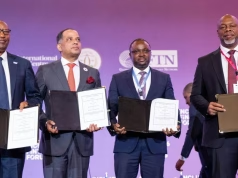The Nigerian economy could see a significant growth boost as the nation undertakes a major bank recapitalization effort. Experts argue that by increasing the asset base of Nigerian banks, this move will strengthen the financial sector and provide the capital needed to fuel economic expansion. Currently, the country’s bank assets lag significantly behind peers in economies of similar size.
According to Ike Chioke, group managing director at Afrinvest West Africa Limited, this low asset-to-GDP ratio presents a compelling argument for increasing banks’ capital buffers.
Currently, Nigerian bank assets represent a mere 16.4% of the nation’s $0.5 trillion GDP. This contrasts sharply with Egypt (100%), South Africa (74%), and Kenya (47%). The gap widens further when compared to nations with economies near Nigeria’s target $1 trillion mark: Brazil (125%), Mexico (45%), and the Netherlands (104.6%).
Chioke’s analysis of Nigeria’s top ten banks underscores this point. Their combined assets of $180 billion pale in comparison to Brazil’s top ten ($1.6 trillion) or Indonesia’s ($523 billion).
“There’s clearly a lot of work to be done,” Chioke noted during a recent BusinessDay roundtable.
The Central Bank of Nigeria (CBN) agrees. In March 2024, they mandated a significant increase in minimum capital requirements for banks across various authorizations. This move aims to fortify Nigerian banks against economic shocks and support the ambitious goal of achieving a $1 trillion economy by 2030.
Experts like Chioke believe recapitalization will create stronger, more resilient banks capable of underwriting larger credit lines, ultimately revitalizing the economy. However, to avoid creating detached financial gains, they stress the need to channel this increased liquidity into the real sector.
While the recapitalization exercise presents challenges, analysts like Ayokunle Olubunmi of Agusto and Co see potential benefits. “This time around, there’ll be a lot of foreign investors. It’s a good strategy to bring in FDI [Foreign Direct Investment],” he states.

























